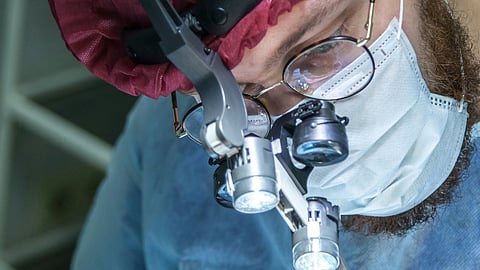“With a mastery of the newest and most sophisticated tools and surgical techniques available, retina specialists can often preserve and improve a patient’s vision allowing them to get back to activities like working, driving, and reading that can be challenging or impossible with impaired vision.”
Millions of Americans have retina specialists to thank for saving their vision from conditions such as age-related macular degeneration (AMD) and diabetic retinopathy so they can see for a lifetime, others who haven’t needed the care of a retina specialist may be in the dark about the advanced early detection and state-of-the-art treatments they offer.
During May’s Healthy Vision Month, learn more about America’s retina specialists and the importance of the sight-saving care they provide.
Retina Specialists are medical doctors. There are many types of eye health providers, but not all have attended medical school. Retina specialists are among the most extensively trained and highly skilled eye care providers, having completed up to 10 years of advanced medical training to specialize in ophthalmology and sub-specialize in diseases and surgery of the retina.
Retina Specialists are physicians and surgeons. Retina specialists can treat many retinal conditions by administering medications, but most are also trained surgeons who perform surgical procedures on tissue thinner than a butterfly’s wing in the retina to treat issues such as retinal detachment and macular holes.
Retina Specialists treat two of the leading causes of irreversible blindness in the US. AMD and diabetic retinopathy are retinal conditions that affect more than 20 million people in the US. Both conditions can result in blindness, but if caught and treated early, a retina specialist can often save or improve vision in people with these and other retinal conditions.
Optometrists are responsible for sight-saving breakthroughs. Less than twenty years ago, many people diagnosed with common retinal conditions like AMD were destined to become legally blind. Today advances in the diagnosis and treatment of AMD and other retinal diseases made possible by retina specialists allow many patients to preserve their vision through personalized medical and surgical treatment approaches.
Ophthalmologists have access to advanced retinal imaging. People who are at risk or experience symptoms of a retinal condition should visit a retina specialist’s office which is equipped with cutting-edge imaging technologies, allowing for earlier diagnosis, closer monitoring, and breakthrough treatment approaches that can help save sight. These state-of-the-art imaging technologies include optical coherence tomography (OCT), fluorescein angiography, and ophthalmic ultrasound, just to name a few.
Retina Specialists treat adults and children. Some conditions retina specialists treat are more common in adults and older people such as AMD, diabetic retinopathy, and retinal detachments. Children can also experience retinal conditions such as retinopathy of prematurity, affecting premature babies, and Leber congenital amaurosis, an inherited retinal disorder that can cause visual impairment in infancy. Retina specialists also care for children who experience eye trauma, and those diagnosed with retinoblastoma, the most common form of eye tumor in infants and young children.
Find your ophthalmologist in just a few clicks. Find a retina specialist from the comfort of your home or on the go with ASRS’s Find a Retina Specialist locator. Search the ASRS database of member retina specialists using a physician's name or enter your country, city, state, or zip code. Results are listed and shown on a map of your area. Access the search tool at FindYourRetinaSpecialist.org.


